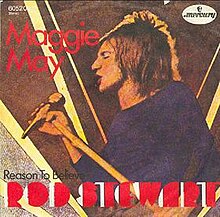Maggie May
| "Maggie May" | ||||
|---|---|---|---|---|

German picture sleeve
|
||||
| Single by Rod Stewart | ||||
| from the album Every Picture Tells a Story | ||||
| A-side | "Reason to Believe" | |||
| Released | July 1971 | |||
| Format | 7-inch 45 rpm | |||
| Recorded | 1971 | |||
| Genre | Rock | |||
| Length | 5:15 | |||
| Label | Mercury | |||
| Writer(s) | Rod Stewart | |||
| Producer(s) | Rod Stewart | |||
| Rod Stewart singles chronology | ||||
|
||||
"Maggie May" is a song written and performed by singer Rod Stewart from his album Every Picture Tells a Story, released in 1971.
In 2004, Rolling Stone ranked the song number 131 on their list of The 500 Greatest Songs of All Time.
"Maggie May" expresses the ambivalence and contradictory emotions of a boy involved in a relationship with an older woman, and was written from Stewart's own experience. In the January 2007 issue of Q magazine, Stewart recalled: "Maggie May was more or less a true story, about the first woman I had sex with, at the 1961 Beaulieu Jazz Festival." The woman's name was not "Maggie May"; Stewart has stated that the name was taken from "... an old Liverpudlian song about a prostitute."
The song was recorded in just two takes in one session. Drummer Micky Waller often arrived at recording sessions with the expectation that a drum kit would be provided and, for "Maggie May", it was – except that no cymbals could be found. The cymbal crashes had to be overdubbed separately some days later.
The song was released as the B-side of the single "Reason to Believe", but DJs in the United States (reportedly in Cleveland, Ohio, and at WMEX in Boston) became fonder of the B-side and "Maggie May" became the more popular side. However, the single continued to be pressed with "Maggie May" as the B-side. The song was Stewart's first substantial hit as a solo performer and launched his solo career. It remains one of his best-known songs. A live performance of the song on Top of the Pops saw the Faces joined onstage by DJ John Peel, who pretended to play the mandolin (the mandolin player on the recording was Ray Jackson of Lindisfarne).
...
Wikipedia
